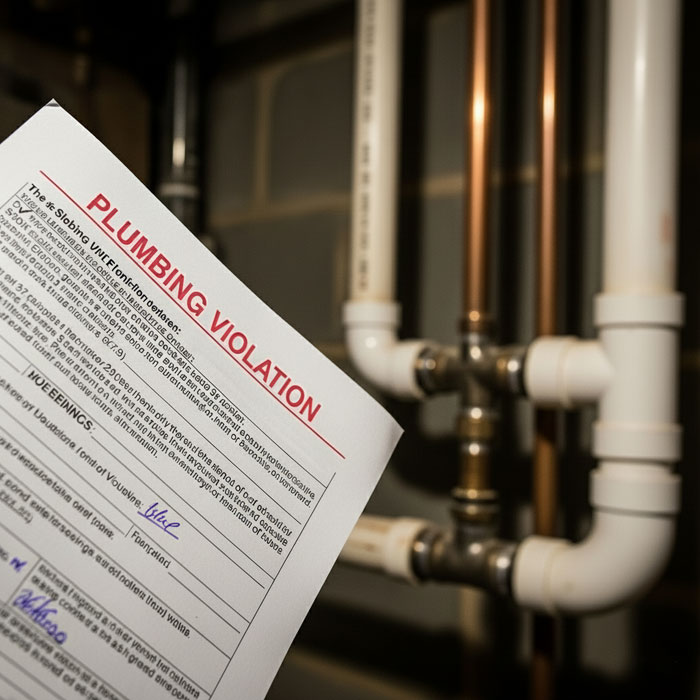
Plumbing violations can feel overwhelming when you're a homeowner trying to keep everything running smoothly. Understanding what these violations mean and how to handle them properly can save money and keep your home safe.
What Plumbing Violations Mean for Homeowners
A plumbing violation isn't just a piece of paper from the city. It's an official notice that something in your home's plumbing system doesn't meet local building codes. These codes exist to protect public health, prevent water contamination, and keep homes safe from damage. When you get a violation notice, it means an inspector or official has identified a problem that needs fixing. Ignoring it won't make it disappear. The violation stays on your property record until you address it properly.
How Plumbing Violations Are Usually Found
Most violations come to light in a few common ways. Home inspections during a sale often reveal hidden problems that sellers didn't know existed. City inspectors might spot issues during routine checks or when investigating neighbor complaints. Sometimes water department workers find illegal connections or backflow problems during meter readings. Permit inspections catch violations too, especially when homeowners hire contractors for renovations. Even insurance adjusters can flag plumbing issues that violate code.
The Most Common Plumbing Code Violations
Certain violations show up repeatedly across different homes and neighborhoods. Improper drain slope causes water to pool instead of flowing correctly. Missing or broken vent pipes prevent proper drainage and let sewer gases enter living areas. Cross-connections between potable water and contaminated sources create serious health risks. Illegal fixture installations, like adding a bathroom without permits, violate building codes. Outdated materials such as lead pipes or polybutylene tubing often fail inspections. Water heater issues, including missing pressure relief valves or improper clearances, pose fire and explosion dangers.
Signs You Might Have a Plumbing Violation Without Knowing It
Your home might be sending signals that something's wrong with the plumbing system. Slow drains throughout the house or gurgling sounds from drains suggest venting problems. Sewage smells indicate broken seals or missing traps. Water pressure that's too high or too low points to regulation issues. Visible pipe corrosion or leaks mean materials are failing. Discolored water coming from taps can signal cross-contamination or corroded pipes.
What to Do When You Receive a Plumbing Violation Notice
Getting a violation notice requires quick action. Read the entire document carefully to grasp what's wrong and when you need to fix it. Contact the issuing department if anything seems unclear or confusing. Don't panic, but don't ignore it either. Document everything by taking photos of the problem areas. Call a licensed plumber immediately to assess the situation. Get written estimates for repairs and keep all paperwork organized. Respond to the notice by the deadline stated, even if repairs aren't finished yet.
Understanding Permits and Inspections
Permits aren't red tape designed to annoy homeowners. They're part of a safety system that protects everyone. Most plumbing work beyond basic repairs requires a permit. Installing new fixtures, moving pipes, or adding plumbing to new areas all need official approval. The permit triggers inspections at different stages of work. Inspectors verify that everything meets code before walls close up or systems activate. Skipping permits creates violations that surface later during sales or refinancing. Getting caught doing unpermitted work often means tearing out completed repairs and starting over.
The Real Costs of Ignoring a Plumbing Violation
Turning a blind eye to violations gets expensive fast. Fines accumulate daily once deadlines pass. Some cities charge hundreds of dollars per day for ongoing violations. Property liens can attach to your home, blocking sales or refinancing. Insurance companies might deny claims related to known violations. Water damage from faulty plumbing destroys floors, walls, and belongings. Health problems arise when contaminated water enters drinking supplies. Legal liability hits hard if someone gets sick or injured because of your plumbing issues.
Safety Hazards Behind Plumbing Violations
Violations exist because someone identified a genuine danger. Cross-connections let sewage mix with drinking water, spreading disease. Missing backflow preventers allow contamination during pressure drops. Improperly vented drains release toxic gases like methane and hydrogen sulfide into homes. These gases cause headaches, dizziness, and worse. Old or damaged water heaters can explode when pressure builds without relief. Corroded pipes burst suddenly, flooding homes and causing electrical hazards. Mold grows in hidden leaks, triggering respiratory problems and allergies.
Selling or Buying a Home with Plumbing Violations
Violations complicate real estate transactions considerably. Sellers must disclose known violations to potential buyers. Many buyers walk away from homes with serious plumbing issues. Lenders often refuse mortgages until violations are fixed and cleared. Sellers typically need to resolve violations before closing or offer credits for buyers to handle repairs. Buyers should always get thorough inspections before purchasing. Finding violations after closing becomes your problem to solve. Title searches sometimes reveal old violations that previous owners never fixed. These can delay or kill deals entirely.
How Long You Have to Fix a Plumbing Violation
Timelines vary based on violation severity and local regulations. Minor issues might allow 30 to 60 days for repairs. Serious safety hazards often require immediate correction within days. Your violation notice states the deadline clearly. Missing deadlines triggers escalating fines and legal action. You can request extensions if repairs are complex or you're waiting for parts. Document your repair efforts and communicate with officials regularly. Some jurisdictions offer more flexibility when you show good faith efforts. Others enforce deadlines strictly regardless of circumstances.
How to Fix Plumbing Violations the Right Way
Proper violation correction follows a clear path. Start by hiring a licensed plumber who specializes in code compliance. They'll create a repair plan that addresses every issue listed in the violation. Pull all necessary permits before starting any work. Complete repairs according to current codes, which might differ from when your house was built. Schedule inspections at required stages so officials can verify compliance. Keep detailed records of all work, including invoices, permits, and inspection certificates. Submit proof of completion to the department that issued the violation. Follow up to confirm the violation has been officially cleared from your property records.
The Role of Licensed Plumbers in Fixing Violations
Licensed plumbers bring specialized knowledge that DIY fixes can't match. They know current codes and what inspectors expect to see. A good plumber will examine the violation, explain what needs fixing, and complete work that passes inspection. They pull permits when required and schedule follow-up inspections. Their license means they carry insurance and stand behind their work. Hiring an unlicensed handyman might seem cheaper, but it often makes violations worse. Inspectors want to see work done by qualified professionals who understand local requirements.
When to Dispute or Appeal a Plumbing Violation
Sometimes violations get issued incorrectly or unfairly. You have the right to challenge decisions that seem wrong. Dispute violations when inspectors misread codes or miss grandfathered exceptions. Some older homes have legal nonconforming plumbing that doesn't need updating until you renovate. Gather evidence supporting your position, including photos and code references. Hire a plumbing expert to provide professional opinions. File appeals within stated timeframes, usually 10 to 30 days. Present your case clearly at hearings, sticking to facts rather than emotions. Be prepared to compromise if some issues are valid.
Preventing DIY Mistakes that Cause Plumbing Violations
DIY plumbing projects save money but create violations when done wrong. Know which jobs require professional help and permits. Simple faucet replacements are usually fine to handle yourself. Adding new fixtures or moving drain lines crosses into territory that needs licensed work. Research codes before attempting any project. Use approved materials that meet local standards. Don't hide plumbing problems behind walls in the hope that inspectors won't find them. Future inspections will discover shortcuts and unpermitted work. The money saved now costs much more later when violations surface.
How to Avoid Plumbing Violations in the Future
Prevention beats dealing with violations after they happen. Always hire licensed plumbers for anything beyond basic maintenance. Get permits for work that requires them, even if it feels like a hassle. Keep up with routine maintenance to catch small problems before they become violations. Know your local plumbing codes, especially if you're planning renovations. Ask contractors for proof of licensing and insurance before hiring them. Have your plumbing inspected periodically, especially in older homes. Replace outdated materials before they fail and create emergencies.
The Long-Term Benefits of Code Compliance
Meeting plumbing codes protects your biggest investment. Proper plumbing systems last longer and perform better. Your family stays healthier when water quality meets safety standards. Home values remain strong when everything passes inspection. Future renovations go smoother without underlying code issues. Insurance claims get approved when systems meet requirements. You sleep better knowing your home won't flood or expose your family to contamination. The peace of mind alone justifies doing things right from the start.
Dealing with plumbing violations takes patience, money, and attention to detail. But handling them promptly and properly protects your home, health, and financial well-being. Don't let fear or frustration keep you from addressing these issues head-on. Licensed professionals can guide you through repairs and inspections until your property clears all violations. Taking proactive steps now prevents bigger problems down the road.
Plumbing violations might sound intimidating, but they're just issues that need correction. The real goal is safety and reliability. With the right plumber, proper permits, and a little attention to detail, any homeowner can get their plumbing back in good standing. Addressing violations early avoids future problems and keeps the home's water system dependable for years to come.


